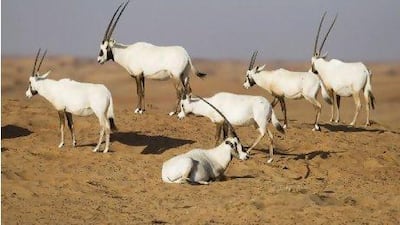DUBAI // A vast international wildlife reserve must be set up in the Rub' Al Khali desert to secure the future of the Arabian oryx, says one wildlife expert.
The oryx is a type of antelope that once roamed across the Arabian Peninsula but became extinct in the wild in 1972, largely due to over-hunting. The animal's distinctive white coat stands out in the desert, and this made it easy prey for hunters following the introduction of 4x4s and automatic weapons. The species was saved by captive breeding programmes in the UAE and elsewhere.
The idea put forward by Dr Reza Khan, Dubai Municipality's wildlife and zoo specialist, is for a sanctuary that would stretch across the Empty Quarter to include UAE, Saudi and Omani territory, allowing the animals to wander freely across the entire area.
"The oryx is a majestic desert animal and it must be properly reintroduced as part of our duty towards nature and maintaining its proper balance," said Dr Khan.
"There is an urgent need to have a trans-boundary regional park, sanctuary or Arabian oryx reserve encompassing in the Rub' Al Khali desert within the UAE, Oman and Saudi Arabia where large herds of oryx can roam freely.
Intensive awareness campaigns aimed at the Bedouin tribes that live around the edges of the world's largest sand desert would be needed to make the project a success, he said.
"We need to prepare the nomadic and other peoples to be tolerant to the presence of the oryx in the region. Massive public awareness campaigns are urgently needed."
Oryx have been reintroduced into the wild with varying degrees of success in Oman, where the population was decimated by poachers, and Saudi Arabia. Animals have been released in semiwild parts of Abu Dhabi, and the Dubai Desert Conservation Reserve (DDCR) and Abu Dhabi's Sir Bani Yas Island have thriving herds.
There are a number of private collections in Dubai and other emirates, though some suffer from problems related to inbreeding because of their limited gene pools. This problem could be addressed in the proposed multinational reserve if it were stocked with animals from a variety of sources.
Last year the oryx made history when its threat status was downgraded from "endangered" to "vulnerable" in the red list published by the International Union for Conservation of Nature. It was the first species to be reclassified as vulnerable after becoming extinct in the wild.
Dr Khan added: "The oryx is a majestic desert champion that can thrive without drinking any water for half a year or so and looks unique when it runs through the sandy desert. It is part and parcel of the Arabian Peninsula's fauna."
The reserve plan has been welcomed by Dr Elsayed Mohamed, programme manager at the Dubai office of the International Fund for Animal Welfare. He said a similar international approach had been successfully adopted in Africa to protect a number of species, including the elephant.
"This would be a very good idea," he said. "It is very important to have cooperation between neighbouring countries, otherwise one will conserve and another will not and the work will suffer.
"In this case, you'd need to coordinate between these three parties - the UAE, Saudi Arabia and Oman - to have an area where oryx could cross the borders between them. The coordination would cover conservation measures, combating the illegal trade in protected animals and poaching."
Greg Simkins, conservation manager at the DDCR, said: "Within the region work on the conservation of the oryx is ongoing, with both national and regional strategies being developed. The ultimate goal is to have self-sustaining free-ranging herds across its historical range."
The Rub' Al Khali covers a fifth of the Arabian Peninsula, stretching for 650,000 square kilometres over parts of the UAE, Saudi Arabia, Oman and Yemen. Local people say wild oryx were seen in the western reaches until the 1960s.

